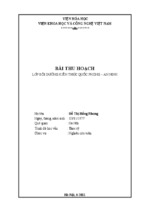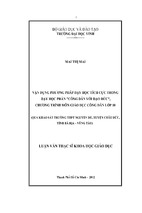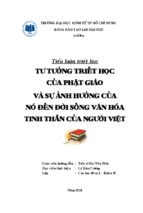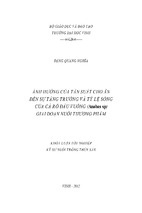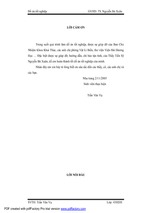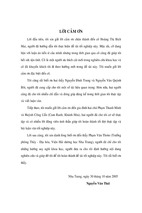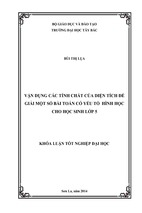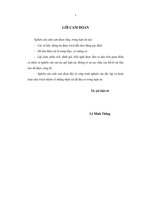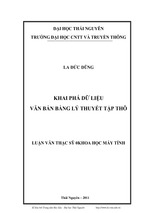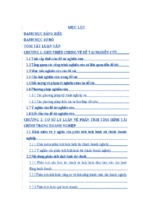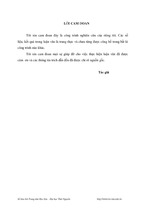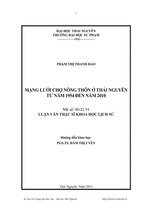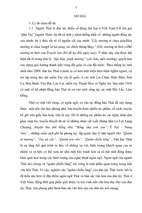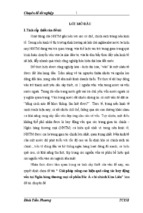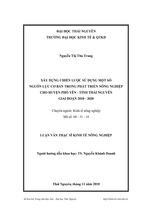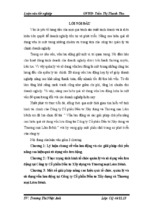CAN THO UNIVERSITY
SCHOOL OF EDUCATION
ENGLISH EDUCATION DEPARTMENT
B.A. THESIS
INFLUENCE OF SYNTACTIC DISCREPANCY BETWEEN
ENGLISH AND VIETNAMESE ON WRITTEN ENGLISH
OF NON-ENGLISH MAJORED STUDENTS
AT CAN THO UNIVERSITY
Field of study: English Language Teaching
Supervisor:
LÝ THỊ BÍCH PHƯỢNG, M.A
Student: Nguyễn Thị Mộng Tuyền
Student’s code: 7075917
Class: English Education – 02
Course: 33
Can Tho, May 2011
Influence of Syntactic Discrepancy between English and Vietnamese on Written English of
Non-English Majored Students at Can Tho University
ACKNOWLEDGEMENTS
My thesis was completed thanks to the enthusiastic help and support of many
teachers at Can Tho University, students from four non-English majored classes, my
family, and my friends as well. From my innermost feeling, I would like to thank all
which they have done for my study.
First of all, I would like to express my deep gratitude to my supervisor, Ms. Lý
Thị Bích Phượng, who spent a lot of time on my thesis. She gave me not only
valuable materials and knowledge, but also sincere encouragements. In spite of being
busy at teaching work, my supervisor spent plenty of specious time on correcting my
drafts in detail and provided me with many priceless suggestions. Therefore, if there
are any mistakes in this thesis, they are my own personal mistakes. During the process
of conducting the thesis, I learned from my supervisor a lot both her working principle
and friendliness with students. In fact, I owe a debt of gratitude to my supervisor.
Secondly, I would like to show my sincere acknowledgement to Mr. Nguyễn
Thanh Tùng, Mr. Phan Việt Thắng, Ms. Nguyễn Phương Bảo Trân, and Ms.
Nguyễn Phương Quyên for their permission to collect writing samples from their
classes. In addition, they gave me valuable information about non-English majors’
common mistakes. In fact, this study would not have been completed without their
help.
I wish to express my thankfulness to Ms. Trần Thị Châu Pha for her
instructions in using the Endnote programme for referencing and suggestions as well
as comments on my thesis.
Thirdly, I would like to express my deep thanks to Mr. Nguyễn Văn Lợi and
Ms. Ngô Thị Trang Thảo who gave me advice and comments on my thesis.
Fourthly, I wish to express my gratitude deeply to all teachers who taught me
during my studying at Can Tho University. This study is my thanks to my teachers
who shed a new light on my life.
Fifthly, I wish to express my thankfulness to fifty non-English majored
students for their writing papers, which were an important part in my thesis.
Finally, I would like to show my gratitude to my family and my friends for
their supporting and giving me inestimable advice.
Supervisor: LÝ THỊ BÍCH PHƯỢNG, M.A
i
Student: Nguyễn Thị Mộng Tuyền
Influence of Syntactic Discrepancy between English and Vietnamese on Written English of
Non-English Majored Students at Can Tho University
ABSTRACT
Writing is considered an important but difficult skill (Ping & Alvin, 2006)
because a good writer uses a writing not only to express their stream of thoughts but
also to generate, formulate, and refine their ideas in a good way (Zamel, 1982). To
avoid frustrating their stream of thinking, EFL non-English majors attempt to translate
their ideas from their mother tongue into English, which causes a variety of mistakes
in written English because of the grammatical differences between L1 and L2 (Yan,
2010). To examine to what extent the influence of syntactic discrepancy between
English and Vietnamese on written English of non-English majored students at Can
Tho University, this qualitative research analysed four types of errors consisting of (1)
word order, (2) omission of relative pronouns, (3) verb tenses, and (4) noun forms
which resulted from contrastive syntactic features between English and Vietnamese in
fifty non-English majors’ writing papers. The participants in this study were at the
pre-intermediate level and at the age of 18 – 20 including thirty six females and
fourteen males. The result showed that the contrastive grammatical features between
English and Vietnamese had a significant influence on non-English majors’ writing.
Based on the findings of this study, some recommendations for teaching writing to
Can Tho University non-English majored students were outlined at the end of this
study.
Supervisor: LÝ THỊ BÍCH PHƯỢNG, M.A
ii
Student: Nguyễn Thị Mộng Tuyền
Influence of Syntactic Discrepancy between English and Vietnamese on Written English of
Non-English Majored Students at Can Tho University
TÓM TẮT
Viết được xem là một kỹ năng quan trọng nhưng cũng là một kỹ năng khó
(Ping & Alvin, 2006) bởi vì người viết tốt không chỉ sử dụng bài viết của mình để thể
hiện những dòng suy nghĩ mà còn phải tạo ra, xây dựng, và chọn lọc những ý tưởng
thật tốt (Zamel, 1982). Để tránh làm gãy những dòng suy nghĩ, sinh viên không
chuyên ngành Anh văn thường cố gắng chuyển các ý tưởng của họ từ tiếng mẹ đẻ
sang tiếng Anh, điều này gây ra nhiều lỗi trong văn viết tiếng Anh do sự khác nhau về
mặt ngữ pháp giữa hai ngôn ngữ (Yan, 2010). Để kiểm tra ở mức độ nào sự tương
phản giữa cấu trúc ngữ pháp của tiếng Anh và tiếng Việt ảnh hưởng đến các bài viết
tiếng Anh của sinh viên không chuyên ngành Anh văn tại Đại học Cần Thơ, bài
nghiên cứu định tính này sẽ phân tích mức độ phạm bốn loại gồm (1) trật tự từ, (2)
lượt bỏ đại từ quan hệ , (3) chia thì, và (4) các hình thức danh từ mà gây ra bởi sự
tương phản giữa cấu trúc ngữ pháp của hai ngôn ngữ trên năm mươi bài viết được thu
thập từ năm mươi sinh viên không chuyên. Những sinh viên không chuyên ngành Anh
văn trong bài nghiên cứu này đang ở trình độ sơ cấp và ở độ tuổi từ 18 đến 20 gồm ba
mươi sáu sinh viên nữ và mười bốn sinh viên nam. Kết quả của bài nghiên cứu cho
thấy sự khác nhau giữa cấu trúc ngữ pháp tiếng Anh và tiếng Việt có ảnh hưởng đáng
kể đến chất lượng bài viết của sinh viên. Dựa trên kết quả của bài nghiên cứu này, một
vài đề nghị được đưa ra cho việc dạy kỹ năng viết cho sinh viên không chuyên ngành
Anh văn tại Đại học Cần Thơ.
Supervisor: LÝ THỊ BÍCH PHƯỢNG, M.A
iii
Student: Nguyễn Thị Mộng Tuyền
Influence of Syntactic Discrepancy between English and Vietnamese on Written English of
Non-English Majored Students at Can Tho University
TABLE OF CONTENTS
ACKNOWLEDGEMENTS ............................................................................i
ABSTRACT (English) .................................................................................... ii
ABSTRACT (Vietnamese).............................................................................. iii
TABLE OF CONTENTS ................................................................................iv
LIST OF TABLES ..........................................................................................vi
LIST OF FIGURES.........................................................................................vii
Chapter 1: INTRODUCTION ........................................................................1
1.1. Rationale ..................................................................................................1
1.2. Research question.....................................................................................2
1.3. Hypotheses ..............................................................................................2
1.4. Objective of the study...............................................................................3
1.5. Significance of the study .......................................................................... 3
1.6. General organisation of the study ............................................................. 3
Chapter 2: REVIEW OF LITERATURE.........................................................8
2.1. An assumption of errors resulted from syntactic differences between
English and Vietnamese ..........................................................................4
2.1.1. Word order ...................................................................................4
2.1.2. Omission of relative pronouns .......................................................5
2.1.3. Verb tenses ....................................................................................6
2.1.4. Noun forms ...................................................................................7
2.2. Related studies .........................................................................................9
Chapter 3: RESEARCH METHOD.................................................................15
3.1. Research design ....................................................................................15
3.2. Subjects ................................................................................................15
3.3. Instrument ............................................................................................15
3.4. The procedure of data analysis..............................................................16
Chapter 4: RESULT AND DISCUSSIONS ....................................................17
Chapter 5: CONCLUSIONS, LIMITATIONS AND IMPLICATIONS ...........24
5.1. Conclusions .......................................................................................... 24
5.2. Implications ......................................................................................... 25
Supervisor: LÝ THỊ BÍCH PHƯỢNG, M.A
iv
Student: Nguyễn Thị Mộng Tuyền
Influence of Syntactic Discrepancy between English and Vietnamese on Written English of
Non-English Majored Students at Can Tho University
5.3. Limitations .......................................................................................... 25
5.5. Directions for further research ............................................................. 26
REFERENCES ............................................................................................... viii
APPENDIX .................................................................................................... x
Supervisor: LÝ THỊ BÍCH PHƯỢNG, M.A
v
Student: Nguyễn Thị Mộng Tuyền
Influence of Syntactic Discrepancy between English and Vietnamese on Written English of
Non-English Majored Students at Can Tho University
LIST OF TABLES
----------
Table 1: A comparison of the analyses of L1 and L2 showed eight syntactical areas
bearing signs of direct interference of L1 on L2. (Bhela's study, 1999)
Table 2: Types and numbers of errors in 50 writing samples of the Can Tho University
first-year English-majored students (Thai’s thesis, 2006)
Table 3: Frequencies of the seven mistakes resulted from different structures between
English and Vietnamese (Nguyen’s thesis, 2005)
Table 1: Some unpredicted kinds of errors from the fifty non-English majors’ writings
Supervisor: LÝ THỊ BÍCH PHƯỢNG, M.A
vi
Student: Nguyễn Thị Mộng Tuyền
Influence of Syntactic Discrepancy between English and Vietnamese on Written English of
Non-English Majored Students at Can Tho University
LIST OF FIGURES
-------Figure 1: The percentage of errors made in fifty non-English majors’ writing papers.
Figure 2: The percentage of each type of error in the total number of the four types of
errors in fifty non-English majors’ writing papers.
Supervisor: LÝ THỊ BÍCH PHƯỢNG, M.A
vii
Student: Nguyễn Thị Mộng Tuyền
Influence of Syntactic Discrepancy between English and Vietnamese on Written English of
Non-English Majored Students at Can Tho University
REFERENCES
Ager, S. (2011). A brief introduction to writing and writing system. Retrieved
February 22, 2011, from
www.dialnet.unirioja.es/servlet/fichero_articulo?codigo=211104&orden=0.
Bhela, B. (1999). Native language interference in learning a second language:
Exploratory case studies of native language interference with target language
usage. International Education Journal. Retrieved February 20, 2011, from
www.ehlt.flinders.edu.au/education/iej/articles/v1n1/bhela/bhela.
Bloomfield, L. (2004). The importance of writing. Retrieved February 22, 2011, from
the Commentary Page of the Philadelphia Inquirer
http://plagiarism.phys.virginia.edu/essays/The%20Importance%20of%20Writin
g.html.
Cao, X. H. (1992). Some Preliminaries to the Syntactic Analysis of the Vietnamese
Sentence. Mon-Khmer Studies, 20, 137-151.
Creswell, J. W. (2008). Educational Research (3rd ed.). Lincoln: Pearson Education
International.
Dam, P. (2001). Old habits die hard: Persistent errors in English written by
Vietnamese speakers. Retrieved January 24, 2011, from
http://www.viethoc.com/Ti-Liu/bien-khao/khaoluan/analyzingsomepersistenterrorsinenglishmadebyvietnamesespeakers.
Ellis, R. (1997). Second Language Acquisition. Oxford: Oxford University Press.
Ho, D. V. (2009). English and Vietnamese articles. A Contrastive Analysis, 1, 3-5
Krifka, M. (2005). Aspects of Clause Structure in Vietnamese. 13-24.
Kubota, R. (1998). An investigation of L1-L2 transfer in writing among Japanese
university students: Implications for Contrastive Rhetoric. Journal of Second
Language Writing, 7, 69-100.
Le, H. V. (2009). The word order in Vietnamese and English noun phrase. A
contrastive analysis, 1, 2-13.
Leong, P., & Alvin (2006). Free and Situational Writing. Singapore: Learners
Publishing.
Liu, X. (2008). The use and effect of L1 in L2 writing. Second Language Writing,
6(5), 50-52.
Ngo, N. B. (2001). The Vietnamese Language Learning Framework. Linguistics, 1,
17-19.
Supervisor: LÝ THỊ BÍCH PHƯỢNG, M.A
viii
Student: Nguyễn Thị Mộng Tuyền
Influence of Syntactic Discrepancy between English and Vietnamese on Written English of
Non-English Majored Students at Can Tho University
Nguyen, Đ. H. (1995). Vietnamese syntax and Vietnamese morphology. Retrieved
January 27, 2011, from
http://scholar.google.com.vn/scholar?q=Nguy%E1%BB%85n,+%C4%90.+H.+
(1995).+Vietnamese+syntax+and+Vietnamese+morphology&hl=vi&as_sdt=0
&as_vis=1&oi=scholart.
Nguyen, N. X. L. (2005). Mother Tongue’s Interference in Writing English as a
Foreign Language. Can Tho, Can Tho.
Nguyen, T. C. (2004). Ngữ pháp tiếng Việt (Vol. 2): Nhà xuất bản Quốc gia Hà Nội.
Thai, T. X. H. (2006). Verb Errors in writing EFL of the first-year English-majored
students at Can Tho University. Can Tho, Can Tho.
Theam, O. T. (2008). Omission of the relative pronouns. Retrieved February 20, 2011,
from www.lshk.org/arf2008/doc/arf2008_abstract.pdf.
Thomas, E. B. (1962). The most common mistakes in English usage. New York:
Chilton.
Tran, M. T. (2003). English and Vietnamese Verb Forms and Verb Classes. A
contrastive Analysis, 28(1), 12-19.
Turton, N. D. (1995). ABC of Common Grammatical Errors. London and
Basingstoke: Macmillan Education LTD.
Walsh, K. (2010). The Importance of Writing Skills. Retrieved January 20, 2011, from
http://www.emergingedtech.com/2010/11/the-importance-of-writing-skillsonline-tools-to-encourage-success/
Wolfersberger, M. (2003). L1 to L2 Writing Process and Strategy Transfer: A Look at
Lower Proficiency Writers. Second Language Writing, 7(6), 2-9.
Yan, H. (2010). The Role of L1 Transfer on L2 and Pedagogical Implications. A
Contrastive Analysis, 6(3), 97-103.
Yunping, Y. (2004). Problems in Developing Students' Writing Strategies: An
Investigation of Syntactical and Lexical Errors from Students' Compositions.
First Language Interference, 16.
Zamel, V. (1982). The process of discovering meaning. TESOL Quarterly, 16(2), 195209.
Supervisor: LÝ THỊ BÍCH PHƯỢNG, M.A
ix
Student: Nguyễn Thị Mộng Tuyền
Influence of Syntactic Discrepancy between English and Vietnamese on Written English of
Non-English Majored Students at Can Tho University
APPENDIX
The following are typical writings extracted from fifty writing samples of Can
Tho University non-English majors
Topic 1: Write a letter to your friend telling him or her about your new school
Dear Thao,
How are you? After a long separation, I didn’t write to you. Do you have sad?
I have to tell a interesting story but you want hearing? Present I am studying Can Tho
University. It’s very big and beautifull. CTU has three campus and I am studying in
campus two. It’s very building as the library, the dormitory, C2 building…
Firstly, the library is equipped one thousand new computer connect to the
internet. Update resource very rich as: book, journal, e-books, and email journals. Its
able to help me very much.
Secondly, the dormitory has very rom and present CTU is building add 5000
residence for students. If you can stay, you will give low price and you will feel
convenient.
The next, you go to the C gateway, you will see C2 building. This is pedagogy.
It’s include very ology as: primary education, math… and lecturer are very friendly
and devoted.
After you listen, how do you feel? Do you like? You will write a letter to me
and you don’t forget talking about your impression when I told.
Love,
Huong
Supervisor: LÝ THỊ BÍCH PHƯỢNG, M.A
x
Student: Nguyễn Thị Mộng Tuyền
Influence of Syntactic Discrepancy between English and Vietnamese on Written English of
Non-English Majored Students at Can Tho University
Topic 2: Write a paragraph to talk about your new friend
Writing 1:
Thao Nguyen is my new friend in my English class. She is 19 year old. She is
a student in Can Tho University. She is from Vietnamese. She live in dormitory at
Can Tho University. She like read book, listen to music and shopping. Her email
address is
[email protected]. We are usually chat and send
messages. So, I feel very happy. Thao Nguyen is the girl very lovely and beautiful.
Writing 2:
Thuan is my new friend in my English class. She come from Vinh Long. She is
19 year old. She is student in Dai Hoc Can Tho University. Now, she live in 3/2 street,
Can Tho city. Her telephone number: 0165218242. She very like read book and listen
to music. She major in Elementary Education. With me, she is beautiful and lovely. I
very happy when I have a friend as Thuan.
Topic 3: Write a demand letter to ask for an advice to deal with your problem
in your study or life.
Hello everybody,
My name is Khang. I’m a first-year student of CTU. I love to learn E when I
was in primary school. But I have a problem. I can’t listen, can’t speak to E very
good. I like read E books, but I have trouble due to the each of vocabulary. In my E
class, I feel very happy and comfortable because I talk to teacher and listen to teacher.
What should to do to improve my E listening and speaking skill? Can anyone
give me some advice?
Thank you very much!
Supervisor: LÝ THỊ BÍCH PHƯỢNG, M.A
xi
Student: Nguyễn Thị Mộng Tuyền
Influence of Syntactic Discrepancy between English and Vietnamese on Written English of
Non-English Majored Students at Can Tho University
Chapter 1: INTRODUCTION
The introduction to the study is comprised of six parts. The first part is the rationale
which is the general statement of the problem. The research question, hypotheses, the
objective of the study are mentioned in part 2, 3, and 4, respectively. The fifth one discusses
the significance of the research. The organisation of the study is outlined in the last part of
this chapter.
1.1. Rationale
Writing plays an important role in communication because it helps us convey
feelings, transfer information and express ideas (Ager, 2010). The importance of
writing is also indicated by Walsh (2010, p.2) as follows:
Writing is important because it’s used extensively in higher education and in the
workplace. If students don’t know how to express themselves in writing, they
won’t be able to communicate well with professors, employers, peers, or just about
anyone else.
From Walsh’s viewpoint, it can be drawn out that teaching writing to both
English majored and non-English majored students is necessary. However, putting pen
to paper to write down what we think is a difficult process. In this era, with
development of modern technology, our life becomes more and more comfortable;
however, the marvels of modern technology cannot still assist us in writing well
without our effort (Bloomfield, 2004). To Vietnamese learners, the writing process of
transferring information from Vietnamese to English has been challenging to them.
Learning English in the Vietnamese environment is considered one of the reasons why
non-English majored students attempt to translate their ideas from Vietnamese into
English without paying attention to the contrastive features between the two languages
(Bui, 2002 cited in Tran, 2003). For non-English majored students, the more difficult
they find to make use of English grammatical points, the more frequently they apply
their first language’s syntactic competence to the second language writing. This
problem can reveal that writers at low English proficiency level directly depend on
their mother tongue's syntax in written English in order to keep their stream of
thinking and avoid failure in using language (Arndt, 1987; Cumming, 1989; Raimes,
Supervisor: LÝ THỊ BÍCH PHƯỢNG, M.A
1
Student: Nguyễn Thị Mộng Tuyền
Influence of Syntactic Discrepancy between English and Vietnamese on Written English of
Non-English Majored Students at Can Tho University
1985; Uzawa & Cumming, 1989, as cited in Wolfersberger, 2003). In fact, EFL
students’ writing is influenced by patterns and structures of their first language (L1)
because they transfer their preferred patterns into their written English, which often
results in patterns that are unacceptable in written English. In order to investigate to
what extent the differences between English syntactic structures and Vietnamese ones
affect non-majored learners’ English writing, this paper will analyse four common
errors in non-English majors’ writings which were caused by contrastive syntactic
features between English and Vietnamese and the quality of fifty writings collected
from non-English majored at Can Tho University.
1.2. Research question
“To what extent does the discrepancy between English and Vietnamese
syntactic features influence written English of non-English majored students at Can
Tho University?”
The four types of errors consisting of word order, omission of relative
pronouns, verb tenses, and noun forms were resulted from the different syntactic
features between English and Vietnamese. In order to examine to what extent
Vietnamese syntax influences English writing of non-English majors, the fifty writing
papers from four general English classes were collected in order to analyse the
frequency of making these four types of errors.
1.3. Research hypotheses
Based on the related studies by Bhela (1999), Yunping (2002), Nguyen (2005),
and Thai (2006), it was hypothesised that non-English majored students would make
the four types of errors comprised of word order, omission of relative pronouns, verb
tenses, and noun forms in their writings. It was also hypothesised that the contrastive
syntactic structures between English and Vietnamese would have a significant
influence on written English of non-English majored students.
1.4. Objective of the study
Supervisor: LÝ THỊ BÍCH PHƯỢNG, M.A
2
Student: Nguyễn Thị Mộng Tuyền
Influence of Syntactic Discrepancy between English and Vietnamese on Written English of
Non-English Majored Students at Can Tho University
The objective of this study is to examine to what extent the grammatical
differences between English and Vietnamese influence written English of non-English
majors by investigating the proportion of making four kinds of errors composed of
word order, omission of relative pronouns, verb tenses, and noun forms in fifty nonEnglish majored students’ writing papers.
1.5. Significance of the study
It is assumed that if non-English majored students are instructed to recognise
the contrastive structures between the first language (L1) and the second language
(L2), they will be able to avoid making types of errors related to the negative
interference of L1 on L2 (Yunping, 2002). This study was hoped to provide
Vietnamese learners with the right types of errors in English writing caused by the
discrepancy between English and Vietnamese syntactic structures and some
recommendations for avoiding making these errors in written English. The finding of
this study was also hoped to be pedagogically significant for teaching basic writing
skills to non-English majors.
1.6. General organisation of the study
The study consists of five chapters as follows. The first chapter includes the
general statement of the problem, the statement of hypotheses, the objective, research
problems, and the significance of the research. The organisation of the study is
outlined in the last part of chapter one. In chapter two, an assumption of the four types
of errors resulted from syntactic differences between English and Vietnamese will be
presented. In addition, some related studies will be mentioned in this chapter to find
out similarities and differences among the former studies and how the present study
relates to previous papers. Through findings of related studies and gaps between them,
the reasons for choosing the research topic will be justified at the end of this chapter.
The research design, the procedure of data analysis, participants, and instruments will
be outlined in chapter three. Chapter four will be a process of analysing data gathered
from fifty participants. Then, the finding of the present study will be also reported in
this chapter. The last chapter will contain conclusions, implications, limitations
inferred from this paper and directions for further research.
Supervisor: LÝ THỊ BÍCH PHƯỢNG, M.A
3
Student: Nguyễn Thị Mộng Tuyền
Influence of Syntactic Discrepancy between English and Vietnamese on Written English of
Non-English Majored Students at Can Tho University
Chapter 2: REVIEW OF LITERATURE
This chapter is comprised of two parts. The first one is an assumption of the four
types of errors caused by different syntactic features between English and Vietnamese. The
second part of this chapter is a summary of some related studies and journals to explore
similarities and differences among the previous papers and examine how this study relates to
former studies.
2.1. An assumption of errors resulted from syntactic differences between
English and Vietnamese
2.1.1. Word order
According to Krifka (2005), Vietnamese is an isolating language because all of
the Vietnamese morphemes are isolated words, which is different from English. In
other words, English and Vietnamese are the two contrastive languages in some cases.
In terms of word order of these two languages, Ngo (2001) states that in Vietnamese,
the adjective follows the noun it modifies, but this order is reverse in English. The
following are some illustrations of this issue:
Vietnamese: sách mới;
anh của tôi;
văn học Việt Nam hiện đại
new book;
my brother;
modern Vietnamese literature
English:
Regarding the contrastive features between English and Vietnamese word
order, Le (2009) also points out the same viewpoint that in English noun phrases, most
adjectives precede the head noun, but in Vietnamese, the order is inversive as in the
examples below:
a/ All
beautiful dreams
those
Quantifier
demonstrative
adjective
Tất cả
những
giấc mộng
Quantifier
demonstrative
head noun
b/ All
fresh
flowers
in Uncle Ho’s garden
adj
head noun
prepositional phrase
Quantifier
Tất cả
bông hoa
Quantifier head noun
tươi thắm
adj
Supervisor: LÝ THỊ BÍCH PHƯỢNG, M.A
head noun
đẹp
đó
adjective
trong vườn Bác
prepositional phrase
4
Student: Nguyễn Thị Mộng Tuyền
Influence of Syntactic Discrepancy between English and Vietnamese on Written English of
Non-English Majored Students at Can Tho University
Due to this syntactic difference, Vietnamese students are often confused when
using English noun phrases. They tend to apply word order in Vietnamese noun phrase
structures to English; that is, they usually put the adjective after the noun to express an
English noun phrase, which is a common error in using English (Ngo, 2001).
2.1.2. Omission of relative pronouns
Regarding omission of relative pronouns, according to Theam (2008), when the
relative pronouns “who, whom, which and that” function as predicates, they can be
omitted as in the following example.
Example (1):
This is Tom. You met him yesterday.
This is Tom who you met yesterday.
=> This is Tom you met yesterday.
When reducing relative pronouns which are subjects, the verb needs to be
changed into the present participle or past participle depending on each particular case
(Theam, 2008). In Vietnamese daily conversations, the speakers tend to leave out
relative pronouns without changing verb forms as in example (2). This makes
Vietnamese students have trouble in omitting English relative pronouns appropriately
and correctly. This issue is described by the example below.
Vietnamese
(2) Món quà tốt nhất để tặng cho một người mà có mọi thứ là chuông báo trộm.
Món quà tốt nhất để tặng cho người có mọi thứ là chuông báo trộm.
(Omission of the relative pronoun)
English
(2) The best gift to give a person who has everything is a burglar-alarm.
Right: The best gift to give a person having everything is a burglar-alarm.
Wrong: The best gift to give a person has everything is a burglar-alarm.
It can be referred from the example that when the writers want to omit relative
pronouns, they are required to master the grammatical rules mentioned above, which
are challenging to the non-English majors at pre-intermediate level. Therefore, non-
Supervisor: LÝ THỊ BÍCH PHƯỢNG, M.A
5
Student: Nguyễn Thị Mộng Tuyền
Influence of Syntactic Discrepancy between English and Vietnamese on Written English of
Non-English Majored Students at Can Tho University
English majors at their level will make this type of error if they lack the competence in
this grammatical point which is different from English one.
2.1.3. Verb tenses
The error related to English verb tenses is considered a serious error of nonEnglish majors (Thomas, 1962). Bui (2002, cited in Tran, 2003) also states that
contrastive grammatical features between English and Vietnamese in terms of subjectverb agreement, tense and aspect, and marginal verbs are the main factors making
Vietnamese learners problematic in using English grammar. English verbs follow a
rule in which a verb must agree in number and person with its subject. For instance,
English verbs are inflected to mark the third person singular of the simple present
tense with the inflectional morpheme “-s / -es” (Cao, 1992). The consequence of
having no rule of subject-verb agreement in Vietnamese grammar makes Vietnamese
learners confused when they are exposed to using this target language in English
Nguyen (1995).
In addition to this problem, according to Nguyen (1995), the existence of tense
markers is one of the contrastive features between English and Vietnamese tenses. In
English, the verbs are added with an appropriate inflectional morpheme based on the
time expression or context of the sentence. For instance, the verb in past tense is
inflected with the inflectional morpheme “-ed”, and “-ing” is added to the verbs when
they are in present participle.
Considering the distinction above, Cao (1992) explains that the Vietnamese
language lacks complicated structures of tenses and moods. As a result, Vietnamese
grammar shows the time of the action by putting tense making particles before the
main verb. In some cases, this syntactic contrast prevents non-English majors from
using intricate English tenses because of their fear of making errors. The following are
some examples illustrating this problem.
(1) Hắn
đã
gặp một bạn cũ tuần rồi.
[He past-marker meet one friend old week just past]
=> “He met
an old friend last week.”
(2) Ông thầy đang dạy ngữ pháp tiếng Việt.
[Mr. teacher present-marker teach syntax language Viet]
=> The teacher is teaching Vietnamese syntax.
Supervisor: LÝ THỊ BÍCH PHƯỢNG, M.A
6
Student: Nguyễn Thị Mộng Tuyền
Influence of Syntactic Discrepancy between English and Vietnamese on Written English of
Non-English Majored Students at Can Tho University
Explaining the issue mentioned above, Ngo (2001) states that Vietnamese
grammar is based on word order and sentence structures rather than morphology,
which is similar to many other languages in Southeast Asia. Vietnamese uses
grammatical particles such as “đã, đang, sẽ” to express tenses whereas most of the
inflected languages in Western countries use morphology, particularly inflections for
verb conjugation.
Another problem in expressing the tense is that in some situations, the
Vietnamese tend to leave out tense markers (Krifka, 2005) as in the example below.
English:
Why didn't you come to class yesterday?
Vietnamese: Vì sao hôm qua anh đã không đi học?
English:
I didn't come to class because I was sick.
Vietnamese: Hôm qua tôi đã không đi học vì tôi đã bị ốm.
According to the prescriptive grammar of Vietnamese, the particle “đã” is
expected to use in this situation. However, in reality, the conversation becomes
unnatural if the speaker follows this grammatical point. To the Vietnamese, the time
expression “hôm qua” is adequate to understand that the utterances are in the past.
Therefore, the particle “đã” is often left out in daily conversations. Because of this
habit, Vietnamese learners of English have the tendency to leave out grammatical
particles such as “đã, đang…” in Vietnamese and inflectional suffixes “-ed”, “-ing”,
“s /es” in English. It is the reason why Vietnamese learners produce a variety of errors
in the use of English tenses. (Nguyen, 1995)
2.1.4. Noun forms
In Vietnamese, there is no particular definition of articles. That causes many
controversial views about whether or not articles exist in Vietnamese (Ho, 2009).
According to Vo (2008, cited in Ho, 2009), there are 13 articles in Vietnamese:
1. con: con gà, con voi, coi chuột, etc.
2. cái: cái nhà, cái bàn, cái ghế, etc.
3. ngôi: ngôi nhà, ngôi chùa, ngôi đền, etc.
4. ngọn: ngọn núi, ngọn đồi, ngọn sóng, etc.
Supervisor: LÝ THỊ BÍCH PHƯỢNG, M.A
7
Student: Nguyễn Thị Mộng Tuyền
Influence of Syntactic Discrepancy between English and Vietnamese on Written English of
Non-English Majored Students at Can Tho University
5. cánh: cánh tay, cánh đồng, cánh rừng, etc.
6. tay: tay quần vợt, tay chơi, tay nghề, etc.
7. đấng: đấng anh hào, đấng nam nhi, etc.
8. nhà: nhà văn, nhà thơ, nhà buôn, etc.
9. bản: bản sao, bản danh sách, bản liệt kê, etc.
10. quả: quả cam, quả quýt, quả xoan, etc.
11. cây: cây dừa, cây mít, cây xoài, etc.
12. tấm: tấm áo, tấm phản, tấm danh thiếp, etc.
13. chiếc: chiếc lá, chiếc khăn, chiếc nón, etc.
However, Tuong (2004, cited in Ho, 2009) argues that the words listed above
are not Vietnamese articles. He also states that these 13 words are classifiers used to
modify head nouns. Because the classifiers do not exist in English, there are no
equivalents between the two languages in this case.
According to Ho (2009), although there have been contrastive viewpoints on
Vietnamese articles, there is a unique view that using classifiers or articles in
Vietnamese is optional depending on the speaker.
Example:
Vietnamese: Anh gửi lá thư dùm em chưa?
English:
Have you sent the letter for me yet?
In this situation, the noun “letter” is a definite noun. Using the definite article
“the” in this sentence is obligatory in English. In Vietnamese, if the speaker wants to
focus the noun, they often add the classifier “cái” to the noun like “Anh gửi cái lá thư
dùm em chưa?” Using the classifier “cái” to emphasise the noun “letter” is optional in
Vietnamese. Because of this feature, Vietnamese learners tend to leave out the articles
in English, which causes errors of the English noun form (Ho, 2009).
The next contrastive grammatical feature between English and Vietnamese is
the form of plural nouns. In English, the plural ending “s / es” is added to countable
nouns in order to form plural nouns (Turton, 1995). On the contrary, Vietnamese
plural nouns do not require any endings. In other words, Vietnamese nouns remain
unchanged in both singular and plural forms. Instead of adding plural endings,
Supervisor: LÝ THỊ BÍCH PHƯỢNG, M.A
8
Student: Nguyễn Thị Mộng Tuyền


